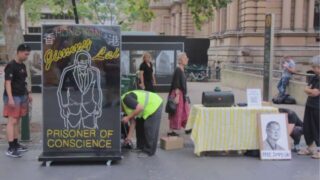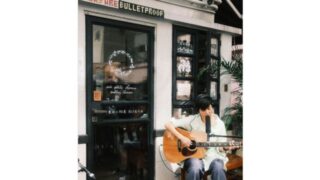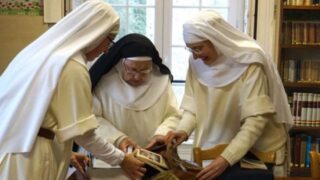Fearing that pro-democracy demonstrations will kindle the spirit of Catholics refusing to join the Patriotic Church, the CCP expands restrictive measures.
by Tang Zhe
Some of Hong Kong’s Catholic clergy are active supporters of the pro-democracy movement that had evolved from the anti-extradition bill protests in June. Like Joseph Ha Chi-shing, the Auxiliary Bishop of the Diocese of Hong Kong, is even regarded as one of the movement’s moral leaders. Cardinal Joseph Zen Ze-kiun, Bishop Emeritus of Hong Kong and a long-time human rights advocate, held three prayers for Hong Kong on September 15. “In this moment that our freedom, dignity, and justice is being deprived here in Hong Kong, let us have a pilgrimage to visit three churches and pray to our Lady, who understands the meaning of sorrow, to accompany us in this journey of suffering and ask for her intercession,” the cardinal wrote on his Facebook page.


Dreading that the atmosphere of resistance in Hong Kong will ignite the fighting spirit of conscientious objectors who refuse to join the Chinese Patriotic Catholic Association (CPCA), the CCP is intensifying its efforts to force them under its control. Some priests have been targeted for arrests, and closures of Catholic places of worship have become more frequent than ever.
A priest forced to go on the run
According to a churchgoer in the Diocese of Yujiang in the southeastern province of Jiangxi, a priest who refuses to join the CPCA received news in early September that the government was planning to arrest him in order to “prevent the underground Catholic Church in mainland China from uniting with the Catholic Church in Hong Kong.” Since then, he had no choice but to go into hiding; he cannot use his mobile phone and doesn’t dare to return to his residence. It seems that the priest has long been anticipating to be persecuted by the state. “You must be prepared,” he told his congregation once. “If I’m placed under house arrest one day, you must persevere in your faith, recite the Rosary, and pray.”
Although the Vatican Guidelines of 2019 state that priests and bishops who refuse to join the CPCA out of conscience should be “respected,” the CCP has never stopped persecuting them.
The Hong Kong card was also played to force the person in charge of a Catholic church in a village under the jurisdiction of Yingtan city in Jiangxi Province to join the CPCA. On August 13, government officials threatened to arrest him and revoke the minimum living subsidy of all Catholics in the village if he refused to sign the joining agreement. The person in charge told the officials that he would rather be arrested than join the CPCA.
No visits to Hong Kong allowed
To force the clergy into joining the CPCA and hinder any attempts of alliance-building, the Chinese regime is also prohibiting them from visiting Hong Kong.
A clergyman from the Diocese of Yujiang told Bitter Winter that he had been invited by Cardinal Zen to visit Hong Kong in August to participate in church activities. Because of the protests and intensified control by the authorities, he was unable to go.
“Cardinal Zen is quite concerned about our underground churches in mainland China. Perhaps he has asked me over to learn about their plight, but the CCP won’t allow me to travel; there’s nothing I can do,” the clergyman said regretfully.
According to local parishioners, from July to August, at least five Catholic meeting venues in the Diocese of Yujiang were forcibly shut down for refusing to join the CPCA. A local priest said that the reason the government is forcing Catholics to become part of the Patriotic Catholic Church is to control them further and cut off all contact between them and the outside world.
“The government places spies in CPCA churches to specially monitor what priests say in their sermons and what activities they hold,” explained the priest. “What time they go out each day, what time they return, how many days they leave for, what the purpose of their travels is – all of this is reported to the government. Basically, the state knows everything about the priests.”
He added that the CPCA is very bureaucratic, is independent of the Vatican, and violates the hierarchy of the Catholic Church. “It cannot receive recognition from God. We believe in Him to obtain His acceptance. If we joined the CPCA, our belief in God would lose its meaning,” the priest gave his reasoning. He also expressed hope that human rights organizations abroad will speak out more vocally on behalf of the Catholic conscientious objectors in mainland China and not compromise with the CCP or remain silent. “That would give us – those of us in China who are committed to our faith – some confidence so that we have the strength to resist the government.”
A parishioner from the Diocese of Yujiang said that Catholics must draw a line between themselves and the CPCA, and must be determined not to waver. “The CPCA is purely a political tool, not a religious organization, because it obeys the Communist Party’s management; they place the Party above all else,” he said. “Internationally, the CCP uses the existence of the Patriotic Church to deceive the world, to show that there is religious freedom in China.”











